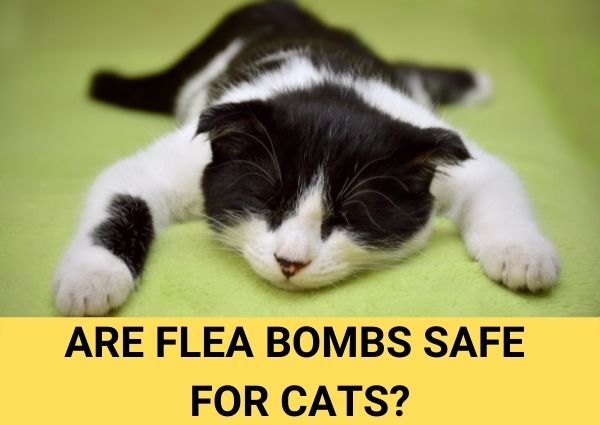You notice your cat scratching more than usual. You start to see tiny black specks on their fur. You realize your cat has fleas. Now you’re faced with a decision: do you use a flea bomb or not?
Flea bombs are a popular method for getting rid of fleas, but there is some debate about whether or not they are safe for cats. This article will provide information about flea bombs and how they work.

Conflicting information is one of the challenges people face when determining if flea bombs are safe for cats. Some sources say that flea bombs are safe, while others say they are not. It can be challenging to sort through all of the information and decide.
Another challenge is that even if flea bombs are safe for cats, they can be dangerous for people. If not used properly, flea bombs can release harmful chemicals into the air, a risk to you and your cat.
This article will provide information about flea bombs and how they work. We’ll also discuss flea bombs’ safety for cats and people. By the end of this article, you should have a better understanding of flea bombs and
What Are Flea Bombs?
Flea bombs are just insecticide sprays that come in aerosol cans. They work by releasing a fog of chemicals into the air, killing fleas and other insects.
Most flea bombs contain pyrethrin or pyrethroid, pesticides derived from chrysanthemum flowers. These chemicals are generally considered safe for humans and animals when used as directed.
Some flea bombs also contain methoprene, which is a growth regulator that prevents fleas from being able to reproduce. This chemical can be harmful to fish, so it’s essential to make sure that any methoprene-based flea bomb is used in an area that is not accessible to fish.
What Are Some of the Pros and Cons of Using a Flea Bomb?

Pros:
- Flea bombs are generally considered safe for use around humans and animals.
- Most flea bombs contain pyrethrin or pyrethroid, pesticides derived from chrysanthemum flowers. These chemicals are generally considered safe for humans and animals when used as directed.
- Some flea bombs also contain methoprene, which is a growth regulator that prevents fleas from being able to reproduce, and this can help prevent the flea population from growing.
Cons:
- There is some debate about whether flea bombs are specifically safe for cats.
- The chemicals in flea bombs can be harmful if inhaled, and this is especially true for cats, as they have a higher respiratory rate than humans and are more likely to inhale the chemicals.
- If a cat comes into contact with a recently sprayed area, it could be exposed to harmful chemicals.
- Flea bombs can be dangerous for people if not used properly. If not used properly, flea bombs can release harmful chemicals into the air, a risk to you and your cat.
What Are Some Tips for Using a Flea Bomb Safely?
Some tips for using a flea bomb safely include:
- Read the label carefully and understand the instructions before using the product.
- Ensure the area you are using the flea bomb is well ventilated.
- Keep children and pets out of the area while using the product and at least two hours after application.
- Wear protective clothing, including gloves, a mask, and clothing covering your arms and legs.
- Spray the product in an area that is not accessible to people or animals.
- Leave the area immediately after spraying and do not return until the product has had time to dissipate.
- Wash any clothing or bedding that may have come into contact with the product.
- Talk to your vet or pest control professional if you have any concerns about using a flea bomb.
What Should You Do if You Come Into Contact With a Flea Bomb?
If you come into contact with a flea bomb, it’s essential to take the following steps:
- Leave the area immediately and do not return until the product has had time to dissipate.
- Wash any clothing or bedding that may have come into contact with the product.
- Talk to your vet or pest control professional if you have any concerns.
- If you experience any symptoms, such as difficulty breathing, dizziness, or nausea, seek medical attention immediately.
- If your pet has been exposed to a flea bomb, it’s essential to wash them with soap and water and contact your veterinarian.
What Are the Effects of These Chemicals on Cats?
The chemicals in flea bombs can be harmful if inhaled. This is especially true for cats, as they have a higher respiratory rate than humans and are more likely to inhale the chemicals. If a cat comes into contact with a recently sprayed area, it could be exposed to harmful chemicals. Therefore, it is essential to understand the effects of these chemicals on cats before using a flea bomb.